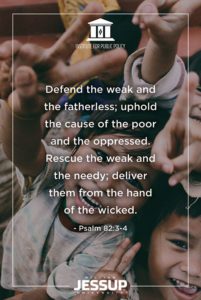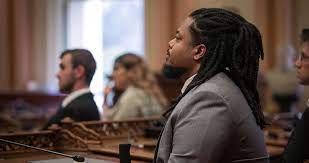Center for Innovation
Overview
The Jessup Center for Innovation is an initiative of an interdisciplinary team of faculty members from the Faculty of the Humanities and Social Sciences, along with other academic units, that works on a number of individual research projects and initiatives.
The Center for Innovation also manages the Student Exchange Program, which is a five week summer intensive internship experience for students at the Capitol in Sacramento.
Center for Poverty Reduction
 The Center for Poverty Reduction creates biblical discussion around issues of poverty and Christian compassion while providing hands-on engagement for both our students and local churches. Jessup students will learn through externships about managing non-profits, grant-writing, healthcare, nutrition, tutoring, public policy and social services.
The Center for Poverty Reduction creates biblical discussion around issues of poverty and Christian compassion while providing hands-on engagement for both our students and local churches. Jessup students will learn through externships about managing non-profits, grant-writing, healthcare, nutrition, tutoring, public policy and social services.
As a Christ-centered higher education learning center, we are committed to developing and facilitating a community of support to explore the many faces of poverty in our local, regional and state. We support and encourage open and honest communication among all those impacted by and involved in serving the poor. This is evangelism in its truest sense: a lifestyle of Christ-likeness caring for the less fortunate and impacting our world in a positive way.
Poverty Overall
In Placer County, 7.43% of the population (28,064 out of 377,789 people) live below the poverty line, a number that is lower than the national average of 14%.
Homelessness
-
Since 2016, California has experienced a larger increase in homelessness than any other state.
-
On any given night, an estimated 130,000 Californians experience homelessness in California, which represents 25 percent of the entire nation’s homeless population
There has been a growing sense of urgency throughout our state to address homelessness. Lawmakers have been clamoring for solutions, industry has responded with their support (e.g. Kaiser’s recent announcement of a $200 million grant) and Placer County is in discussion with the Placer Rescue Mission to develop a campus-style homeless facility less than two miles from the Jessup campus.
Contact
Erin Hill, Associate Dean – School of Business
E: ehill@jessup.edu
Public Policy Fellows Program
The Summer Exchange Program (SEP) brings students from sister campuses to the WJU campus for the purpose of giving participating students access to the Capitol in a distinctive immersion program. The Summer Exchange Course will provide a five-week long intensive summer internship, along with a hands-on curriculum, for students who will receive 5 credits for the experience.
Students will stay in Jessup residence halls, complete their internships and take courses in the evenings and/or on weekends. Courses will be taught by WJU Faculty. Total Cost: $1000 per student +tuition and fees + cost for food/travel.
The SEP is designed to help the student:
1. Create professional and personal networks, including future job prospects that would otherwise be unavailable to students, so that graduates of the program are exceptionally employable.
2. Experience classroom and practicum-based instruction in an intensive immersion program.
3. Develop a broader understanding of California state government and its intersecting role with local, state, and federal government systems and processes
4. Examine California state government through a Christian worldview
5. Develop an understanding of how Christians can impact the state government and public sector workplace.
Upon completion of the program students will be able to:
1. Identify and apply Biblical perspectives to a general understand of local, state, and federal government.
2. Distinguish emerging trends in local, state, and federal government processes.
3. Demonstrate an understanding of the history of California state government.
4. Identify the key players and issues in the California budget process.
Contact
Pete Constant, Chair of Institute of Public Policy
E: pconstant@jessup.edu
Elected Official Arvhive Project
The IPP is in possession of artifacts from members of the California Legislature and those who have served in Congress. The Congressional Archive Project will create an opportunity for student research that will result in an official archive and display of rare and treasured artifacts that commemorate government service.
- Develop a unique elected official archive
The goal is to create an archive for local and state-wide representatives who wish to donate their personal papers to the university after their time in office, allowing for research projects to be undertaken by our students, faculty, and even scholars outside of the university who wish to know more about the careers of these officials and the substantive policy issues they addressed while in office.
- Research opportunity for students, faculty, and outside scholars
We are grateful to former United States Congressman John Doolittle—who represented Placer County in the U.S. House of Representatives—who has already donated many of his congressional papers to the college, and we are very excited about the possibility of expanding this archival collection into the future.
- Resource for interested citizens in our community
This archive will also serve as a venue—eventually open to the public—where interested citizens can visit, view official documents, and learn more about these representatives and their time in public office
Contact
Pete Constant, Chair of IPP
E: pconstant@jessup.edu
Speakers Bureau
The IPP Speakers Bureau has featured many prominent voices over the years, including Michael Medved, Lars Larson, and Sean Spicer, former White House Press Secretary. If you would like to suggest a speaking opportunity to the IPP Speakers Bureau, please contact the IPP Chair, Pete Constant, at pconstant@jessup.edu.
Civil Discourse
Polling data corroborates this assessment. A Gallup poll from September 2016 states that Americans’ trust of both political leaders and their fellow Americans stands at an all-time low.
Whereas 65% of the American people had trust in their political leaders in 1972, that number dropped to 42% by 2016.
Likewise, whereas 83% of Americans trusted one another to make sound political decisions in 1974, that number dropped to 56% in 2016.
Yet, we believe that collectively—as the Institute for Public Policy—we can model, through our own research and example, the kind of civil discourse missing in so much of our politics and policy discussions today; that it truly is possible not to lose our principles when fighting for principles.
Thus, we desire to be both cogent in our research and winsome in our approach, and to be a resource for those who wish to do the same.
We believe that although citizens may not see eye-to-eye on every particular issue, that they should stand shoulder-to-shoulder in support of the constitutional freedoms available to all: to speak freely, and engage fully, in the public square regardless of political preference, race, age, gender, or creed.
-
Policy Deliberation: Reasoning on the merits of public policy
Through our research efforts here at the Institute, we plan to show how vital it is that civil discourse and genuine policy deliberation be part of our endeavors both as fellow citizens and as those engaged actively in the policy arena.
Immigration Policy in American Church History
The political landscape surrounding immigration issues is fluid. Perhaps it has always been. A thorough investigation on how government agencies and the faith community in the past have addressed the issue of immigration might be a valued resource. What has the rhetoric of the faith community been? Has it been influential from a policy standpoint? Has the response changed over time – or is it as fluid as the politics have been. Are there regional differences to the response? Urban-suburban-rural differences? Have denominational entities that have significant “ethnic” constituencies responded differently than those who do not? Have there been political costs associated with perceived or actual “religious” influence on legislation?
Most major expressions of Christianity, Judaism and Islam in the United States have responded to the immigration issue – often formally in the guise of statements or resolutions. What is the shelf life of these resolutions? Are they intended to influence policy? Are they merely pro-forma responses to the controversy de jour? Has it been different in the past? Documents detailing official and unofficial responses from either denominations, judiciaries and major influencers are rather easily accessible. They include statements from the Roman Catholic Church, the National Council of Churches in the USA, the Southern Baptist Convention, a number of faith-friendly think tanks, the Council for American-Islamic Relations and the Union for Reform Judaism among others.
Researching the various responses by institutional expressions of religion in the US surrounding the issue of immigration and immigration policy — and the effect of these responses to their constituents’ opinions about immigration — should prove both interesting and valuable.
Contact
Dr. Rex Gurney, Chair – History
E: rgurney@jessup.edu
K-12 Education Policy Development
We need a place where we can ask meaningful questions and seek unbiased researched based solutions in education. We hope to shape and influence education policy to inform practice in the following areas:
Resource to the community
-
Research: Provide data and analysis to government, school districts, and families regarding educational policy issues. If you have a question, let us investigate it.
-
Policy Development: What gaps exist in your educational community where there is confusion regarding roles and responsibilities? Policy development can help clarify roles and allow for empowering employees to do their job well. If you have a need for clarifying roles and responsibilities, let us help.
-
Student Needs: 70% of states spent less per-student during the 2013-2014 school year than they did before the start of the Great Recession. (Source: Center on Budget and Policy Priorities)
Learning
-
What are the barriers to effective learning for students?
-
Trauma
-
More than TWO THIRDS OF CHILDREN reported at least 1 traumatic event by age 16.
-
One in four young adults between the ages of 18 and 24 have a diagnosable mental illness.
-
More than 25 percent of college students have been diagnosed or treated by a professional for a mental health condition within the past year. From the National Alliance on Mental Illness Health.
-
-
Support adequate resources and options for students to improve & maintain healthy lifestyles with clear expectations on diet and exercise.
-
What is the responsibility of the education system with respect to student and employee health?
-
Only one in three children are physically active every day.
-
Shelter
-
Align schools with a variety of income levels to ensure that affordable housing is part of the community plan.
-
Do very low income levels have access to quality schools and educational resources (including homeless)? According to the 2015 Homeless Count, there are 5,600 people experiencing homelessness in Sacramento County during the year, with over 2,600 on any given night, 35% of whom lack shelter.
-
Safety
-
Ensure that all educational environments promote equal access, respectful acceptance, and appropriate behavioral expectations.
College and Career Readiness
-
Align outcomes with entry level expectations for education.
-
Are K-12 Students prepared to be successful for an undergraduate degree? Are undergraduates prepared for a graduate level degree?
-
One study estimates that 20 percent of first-time college students require remedial coursework (NCES 2013b).
Educational Facilities and Resources
-
-
Creatively consider innovative facilities that are sustainable.
-
Public schools now spend over $3 billion per year on digital educational content as of 2017. (Source: Education Week)
-
-
Placer County Demographics
-
Identify population trends and demographic data to understand how the population is changing. Population changes that impact the need for more/less schools in a community.
-
Placer County and Sacramento County have experienced and will continue to experience tremendous growth compared to other counties in the United States.
-




